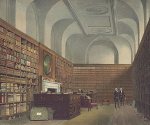18 November
2010
Putting Humanity Back Into the Humanities
Posted in Education, Music & Art, Thomas More Institute Events
 Based upon an introductory presentation given at a session of the Thomas More Institute’s Young Persons’ Reading Group on the purpose of a university education. The presentation, and this article, are intended as a summary of and commentary upon an excellent article by Patrick J. Deneen to which we direct our readers: ‘Science and the Decline of the Liberal Arts’, The New Atlantis, Fall 2009/Winter 2010, available here.
Based upon an introductory presentation given at a session of the Thomas More Institute’s Young Persons’ Reading Group on the purpose of a university education. The presentation, and this article, are intended as a summary of and commentary upon an excellent article by Patrick J. Deneen to which we direct our readers: ‘Science and the Decline of the Liberal Arts’, The New Atlantis, Fall 2009/Winter 2010, available here.
Many think that the decline in respect for the humanities is a recent phenomenon, yet, as Patrick J. Deneen points out in his article ‘Science and the Decline of the Liberal Arts’, this process started long before the 1960s. It began at the advent of the modern period when the scientific revolution came to the fore, as man desired not only to understand the world, but also to master and transform it.
In contrast, the liberal arts rest on concepts of knowledge derived from cultural tradition and religious wisdom which view man himself as a noble object of study. At the heart of man is freedom, for whereas animals are directed toward their end by innate instincts, man, endowed with the power of free will, has the awesome responsibility of using that freedom to choose the correct means to attain his end. As we know, this freedom can be severely abused, leading not to human fulfillment but to human ruin, and so higher forms of learning involve an education not merely in the material aspect of life – something which man shares with plants and animals – but above all in the correct use of free will, the crowning glory of man. Hence, the liberal arts, which study how to use human liberty in pursuit of the good and virtuous life, and not solely in pursuit of material enhancement.
To do this, one must consider the important elements of that tradition: literature, language, history, philosophy, and Scripture. Through these we come to know more clearly what it means to use our freedom correctly – part of what it means to be human – among other things, by entering into dialogue with the accumulated wisdom of those who addressed these questions before us.
Much that passes for science has now destroyed respect for this tradition. Education is now all too often regarded as a utilitarian tool in a world obsessed with ‘global competition’, leading to the drain of money (and students) away from the humanities and toward the natural sciences.
The rise of the natural sciences has, in turn, perverted the study of the humanities in many places. Scholarship in the humanities once consisted in absorption in the tradition, whereas the natural sciences were ordered toward innovation. Pining for bygone days when they were more highly respected, many scholars in the liberal arts now attempt to imitate the research methods of the natural sciences. Whereas these scholars were once judged by the breadth and depth of their learning, they are now judged all too often by the number of published works and citations attributed to them. Thus, in preference to true scholars, those academics are arguably now more likely to be employed who are able to churn out an endless stream of ‘new thinking’ to improve the university’s ‘ratings’. The laboratory has replaced the library at the heart of many modern universities.
Pursuing the path of novelty, some in the humanities have now turned on what they previously admired, challenging the very basis of natural science by arguing that physical facts are ‘socially constructed’. The solution to this chaos is to return the true vision of the liberal arts to its rightful place. The only way to do this is by returning to the true and original meaning of the word ‘university’, which comes from the Latin meaning ‘turning on one’ – one creation, one truth, one God. Only in this way can we avoid the current excesses of modernity and set ourselves on the path of true liberation, which consists in learning to govern ourselves through the right use of our human freedom.
Leave a Reply